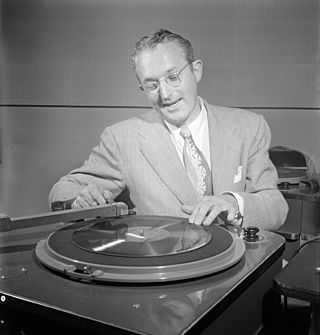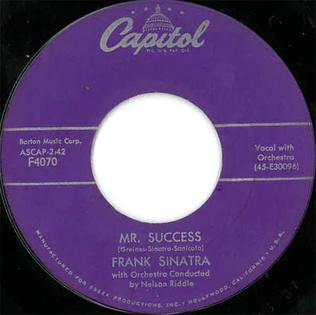

"This Love of Mine" is a popular American song that was first recorded in 1941 by Tommy Dorsey and His orchestra, with a vocal by Frank Sinatra. Sinatra wrote the words and Sol Parker and Hank Sanicola wrote the music. [1]


"This Love of Mine" is a popular American song that was first recorded in 1941 by Tommy Dorsey and His orchestra, with a vocal by Frank Sinatra. Sinatra wrote the words and Sol Parker and Hank Sanicola wrote the music. [1]
The Tommy Dorsey recording was released as a 78 RCA Victor B side single, 27508-B, with Frank Sinatra [2] on vocals backed with "Neiani", which did not chart. "This Love of Mine" reached #3 on the Billboard pop singles chart in 1941–42 in a chart run of 24 weeks. [3] [4] Sinatra re-recorded the song with Nelson Riddle in 1955 for the In The Wee Small Hours album.
The song was copyrighted on August 11, 1941 by Embassy Music. Frank Sinatra was credited with writing the lyrics although this has been disputed by his aide, Tony Consiglio. [5] The music was composed by Sol Parker and Hank Sanicola.
The song became a pop and jazz standard that has been recorded by other performers. [6] Artists who have recorded the song include:

Thomas Francis Dorsey Jr. was an American jazz trombonist, composer, conductor and bandleader of the big band era. He was known as the "Sentimental Gentleman of Swing" because of his smooth-toned trombone playing. His theme song was "I'm Getting Sentimental Over You". His technical skill on the trombone gave him renown among other musicians. He was the younger brother of bandleader Jimmy Dorsey. After Dorsey broke with his brother in the mid-1930s, he led an extremely successful band from the late 1930s into the 1950s. He is best remembered for standards such as "Opus One", "Song of India", "Marie", "On Treasure Island", and his biggest hit single, "I'll Never Smile Again".
"That's Life" is a popular song written by Dean Kay and Kelly Gordon and first recorded in 1963 by Marion Montgomery. The song has an uplifting message that, despite the ups and downs in life, one should not give up but keep positive, because soon one will be "back on top."

"Melody of Love" is a popular song. The music was originally written by Hans Engelmann in 1903. The lyrics were added by Tom Glazer in 1954.
"Fools Rush In" (1940) is a popular song. The lyrics were written by Johnny Mercer with music by Rube Bloom.
"Don't Take Your Love from Me" is a popular song written by Henry Nemo and published in 1941. Mildred Bailey first recorded this song in 1940 before publication. It was introduced that year by singer Joan Brooks.
"South of the Border Down Mexico Way" is a popular song describing a trip to Mexico, written by Jimmy Kennedy and Michael Carr and published in 1939 for the film of the same name starring country star Gene Autry.
"How About You?" is a popular song composed by Burton Lane, with lyrics by Ralph Freed. It was introduced in the 1941 film Babes on Broadway by Judy Garland and Mickey Rooney.

"Frenesí" is a musical piece originally composed by Alberto Domínguez Borrás for the marimba, and adapted as a jazz standard by Leonard Whitcup and others.
"(You'd Be So) Easy to Love" is a popular song written by Cole Porter for William Gaxton to sing in the 1934 Broadway show Anything Goes. However Gaxton was unhappy about its wide vocal range and it was cut from the musical. Porter re-wrote it for the 1936 film Born to Dance, where it was introduced by Eleanor Powell, James Stewart, and Frances Langford under its alternate title, "Easy to Love". The song was later added to the 1987 and 2011 revivals of Anything Goes under the complete title "You’d Be So Easy to Love".

Shirley Bassey is a 1961 album by Shirley Bassey, her fifth studio album and her third with EMI/Columbia. Bassey was accompanied by Geoff Love and his orchestra and The Williams Singers. The album spent eleven weeks on the charts, beginning in February 1962, and peaking at #14. This album was issued in mono and stereo. The stereo version of this album was released on CD in 1997 by EMI.

All Time Greatest Hits, Vol. 1-4 are four compilation albums, issued by RCA of early 1940s Tommy Dorsey tracks featuring Frank Sinatra.

"I'm Glad There Is You (In This World of Ordinary People)" is a song written by Jimmy Dorsey and Paul Madeira (sometimes credited as Paul Mertz) first published in 1941. It has become a jazz and pop standard.

Jazz Contemporary is an album by American jazz trumpeter Kenny Dorham featuring performances recorded in 1960 and released on the Time label. The album features the recording debut of pianist Steve Kuhn.
"The Second Time Around" is a song with words by Sammy Cahn and music by Jimmy Van Heusen. It was introduced in the 1960 film High Time, sung by Bing Crosby with Henry Mancini conducting his orchestra, and was nominated for the Academy Award for Best Original Song. It lost out to "Never on Sunday".

Unforgettable is the twelfth studio album LP record by blues, R&B and jazz singer Dinah Washington, released on the Mercury Records label, and reissued as a compilation album in 1991. The record shows the singer mostly in a pop star role instead of her traditional jazz & blues style. Allmusic reviews the compilation album as saying: "This CD finds Washington singing brief versions of standards in hopes of gaining another hit.". The single "Unforgettable", released in 1959, peaked at No. 10 on the Billboard 200 chart in 1961, and Dinah's recording of the song was inducted into the Grammy Hall of Fame in 2001.

"Mr. Success" is a 1958 popular song recorded and co-written by Frank Sinatra. The song was released as a Capitol Records A-side single.
"Take Me" is a song written by Rube Bloom (music) and Mack David (lyrics). It was recorded by Frank Sinatra with the Tommy Dorsey Band in 1942.

Henry William "Hank" Sanicola was an American music manager, publisher, businessman and pianist, best known for his work and association with Frank Sinatra from the late 1930s to the early 1960s.

Starmaker is a compilation album of phonograph records by Tommy Dorsey, featuring collaborations between Dorsey and artists his band had a role in making popular. These include musicians such as Buddy Rich, composers and arrangers such as Sy Oliver, and vocalists like Frank Sinatra and Jo Stafford. It was released as a part of the Victor Musical Smart Set series.